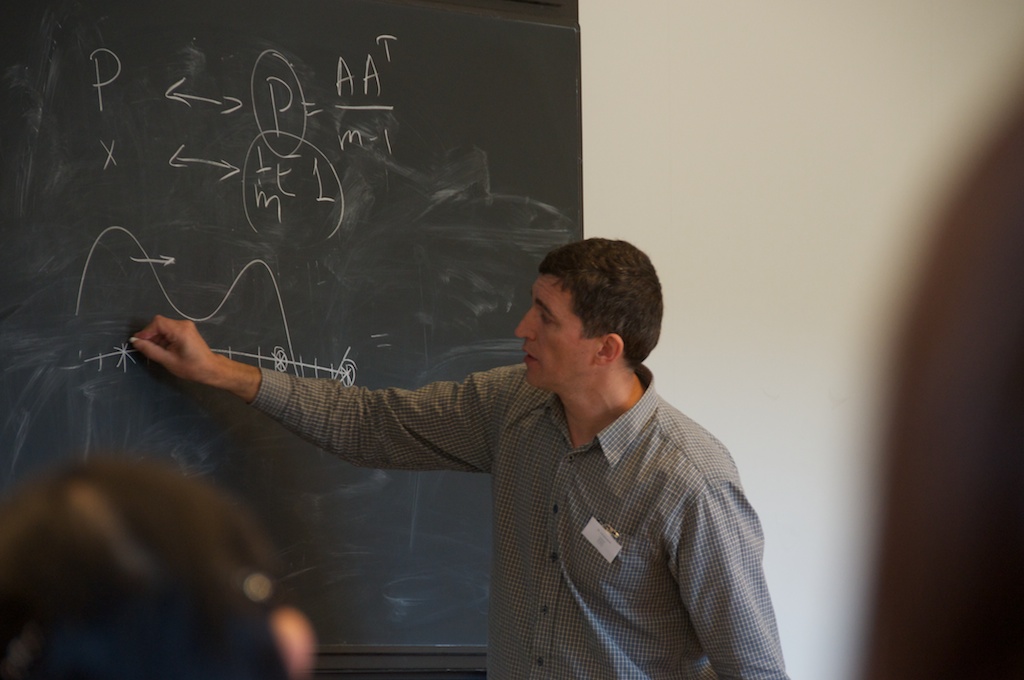Final Report
Overall structure of the program

The overall duration was 5 weeks. It started with the
School on Data Assimilation
(26-30 April 2011), and concluded with a conference (25-27 May 2011),
of which one day was held jointly with the
Centre for Interdisciplinary Mathematics
in connection with an event in Uppsala on
Current Challenges in Climate Modelling 2011
(27 May 2011).
The program brought together scientists from two different fields, where
data-assimilation is used: weather and climate prediction on one hand,
and solar physics on the other hand.
The total number of program participants was 41
including 8 women, and 19 Nordic participant
(Denmark 3, Finland 2, Norway 1, Sweden 13, of which 10 from Stockholm).
A significant portion of the participants came from the UK (8),
as well as France (4) and the US (4).
Of the 31 people from outside Stockholm,
9 stayed for 3 weeks or longer.

During the program we had 2 extended discussion sessions:
one on "Data assimilation of the solar cycle"
and one on "Timescales and (in)predictability".
In addition, we had 23 regular program talks.
For a complete list of program talks see the
time table.
Several participants also attended and gave talks at the
Department of Meteorology (MISU).
In addition, many of us attended the
annual lecture of the
Bert Bolin Centre for Climate Research by
Ralph Keeling (Scripps Inst. of Oceanography) on
Rising carbon dioxide, a never ending story?.
Scientific outcome
During the program, we heard about the application of data assimilation
techniques in a large range of fields ranging from
weather and climate prediction to sea and ocean modeling,
hurricane prediction, geomagnetism, solar cycle and space weather forecast,
and finally turbulence where this technique could perhaps be used
to predict the unresolved small-scale motions.
The interaction with people from different backgrounds has been fruitful
and led to many new insights.
Particularly useful have been discussions about the role of nonlocality
and fluctuations in climate and solar turbulence modelling.
Also illuminating have been discussions on the prospects of being
able to do better than with standard linear filters.
As a result of the program, several
Nordita preprints
are expected to appear.
For example Jonathan Rougier from Bristol says
I have a draft of a paper called something like "Intractable and unsolved:
Some thoughts on data assimilation with uncertain static parameters". I
have had to put it aside for a while but you can be sure that I will fully
acknowledge the very fruitful time I spent at Nordita. I will let you know
as it progresses.
Also Andreas Svedin, Milena Cuellar, and Axel Brandenburg are still writing
on a Astrophysical data assimilation for stratified convection.
- NORDITA-2011-098 Magnetic feature tracking speeds, what determines their motion? by G. Guerrero, M. Rheinhardt, M. Dikpati (2011)
- NORDITA-2011-061 Plasma flow vs. magnetic feature-tracking speeds in the Sun by G. Guerrero, M. Rheinhardt, A. Brandenburg, M. Dikpati (2011)
- NORDITA-2012-029 Plasma flow vs. magnetic feature-tracking speeds in the Sun by J. A. U. Nilsson, S. Dobricic, et al. (2012)
- NORDITA-2012-059 Data assimilation for stratified convection by A. Svedin, M. C. Cuellar, & A. Brandenburg (2012)
Excerpts from selected responses from the participants
- The comments and discussions during and after my talks were enjoyable
and stimulating.
- The program gave me an opportunity to
learn a lot about the broad and active research areas in the field
of data assimilation, predictability and astrophysics.
- My colleagues in Japan are interested in predictability in Astro and Geo
physics, and considering to organize a workshop at RIMS (Research Institute
for Mathematical Science), Kyoto University, ...
- I don't yet have any papers specific to my visit to Nordita last May, but I
did make some good contacts through the summer school and workshop on
Predictability, many of whom I interact with regularly. It was a wonderful
trip and I will always be very grateful to you and your colleagues for
having me visit. I am revisiting various fundamental concepts on
Predictability as I am teaching a new graduate-level course on it this
semester. I also hope that it will spark me to think a little further
about how such concepts can be extended to the astrophysical world.
Other items
During the meeting,
Jörn Warnecke defended his licentiate thesis on
"Flux emergence: flares and coronal mass ejections driven by dynamo action underneath the solar surface" with one of the program participants
(Dr Mausumi Dikpati) as opponent.
Photo gallery




